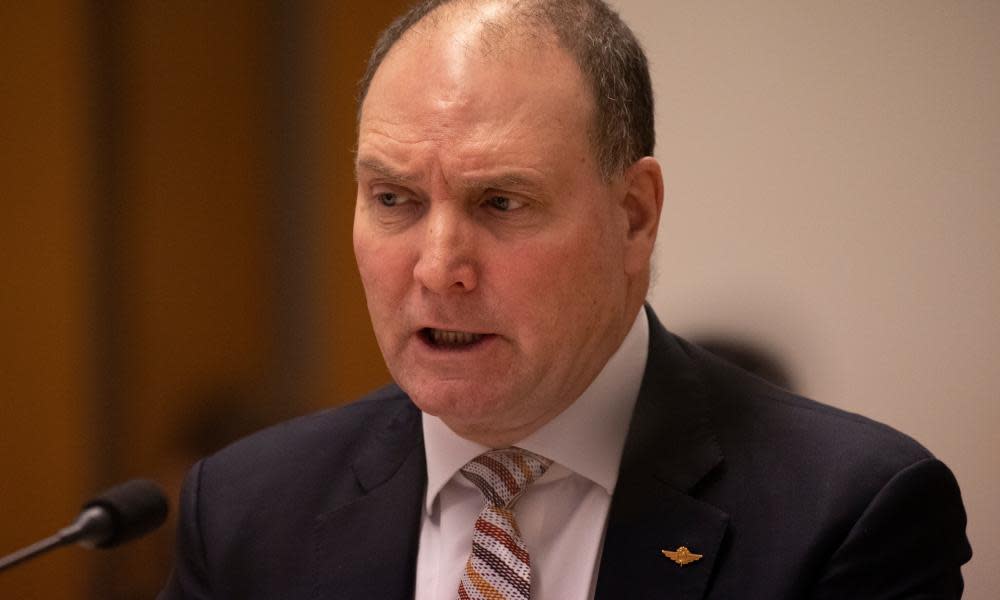Australia's Covid commission downplays 'green recovery' and confirms gas push

The head of Scott Morrison’s Covid advisory commission says he has been approached by business leaders wanting the government to use the recovery from the pandemic to lock in low-emissions energy, but his organisation is not recommending “a green recovery per se”.
Appearing before the Senate committee examining the government’s management of Covid-19 on Tuesday, Nev Power confirmed the commission had asked the government to underwrite new investment in gas pipelines as part of recommendations from a manufacturing taskforce.
Power told senators if the government implemented the recommendations, it would play a role in boosting the attractiveness of new infrastructure to pipe gas around the country by guaranteeing off-take agreements, or “future proofing” infrastructure.
Related: Seizing the moment: how Australia can build a green economy from the Covid-19 wreckage
The former Fortescue executive contended governments intervening to support new gas projects was “not necessarily” a subsidy, and noted there was already considerable intervention in the energy market. Government intervention, Power said, would ensure Australia’s energy market was geared for the needs of energy-intensive manufacturing.
Asked whether he had been approached by business leaders urging the government to use the economic recovery from Covid-19 as an opportunity to lock in renewables, Power acknowledged there had been representations. Power said he did not oppose a green recovery, but the definition of recovery needed further discussion.
When pressed on renewables, Power said the commission had not “looked at energy in that context” – even though the manufacturing taskforce has evidently made specific recommendations about government underwriting of pipelines to improve the viability of gas to power heavy industry.
Power suggested renewable projects were looking for “substantial government support”. While the commission is also clearly recommending regulatory changes to boost the supply and transmission of gas to the domestic market, when asked about renewables, he said it was not the role of the commission to “recommend specific projects”.
The commission chair was also asked whether he had a relationship with Vikas Rambal from Perdaman Chemicals and Fertilisers, a company with an interest in the controversial Narrabri coal seam gas project. Power told senators “I know that gentleman” but said his contact with him was through social and business events, not through common business interests.
Power was also asked for his views about a plan to overhaul national environmental regulations. He said the commission had done no specific work on reforming the Environment Protection and Biodiversity Conservation Act, although it could have been referenced in broader recommendations about deregulation.
But he endorsed the government’s direction in reforming the regime. “I think [the Act] needs to be streamlined,” Power said. He said there was a need to join the state and federal approval processes “so there is one single review and decision” – although he said there should not be shortcuts.
The Narrabri gas development is one of 15 projects of national significance identified by Morrison in mid-June as warranting reduced assessment and decision timeframes under the EPBC Act. Power is one of the government’s most influential business advisers, but he told the hearing Morrison had not consulted him on that list. “I couldn’t list [those projects] for you,” he said.
A leaked report from the manufacturing taskforce headed by Andrew Liveris, a former Dow Chemical executive and current Saudi Aramco board member, recommended the government underwrite an increased national gas supply, that government agencies partner with companies to accelerate development of new fields such as the Northern Territory’s vast Beetaloo Basin, and states introduce subsidy schemes for gas-fired power plants.
The report, revealed by Guardian Australia, also proposed a role for government in helping develop gas pipelines between eastern states and the north, and potentially a $6bn trans-Australian pipeline between the east and west, by either taking an equity position, minority share or underwriting investments.
Power confirmed a final version of that report had gone to the Morrison government in late May. An official from Morrison’s department, Simon Duggan, told Tuesday’s hearing departmental officials had given the government advice about the recommendations in the report.
Officials declined to say when the report would be released.
Environmental groups expressed concern about Power’s advocacy. Jolene Elberth, democracy campaigner for the Australian Conservation Foundation, said the “push for the Australian public to subsidise more gas, a climate-heating fossil fuel, flies in the face of expert advice on our nation’s energy future”.
“The Australian Energy Market Operator’s integrated system plan confirms that Australia can rapidly move to a renewable-powered grid without the need for any new gas,” she said. “The NCC advisory board should acknowledge the contribution gas makes to climate pollution and what impact this has on Australia’s international obligations”.

 Yahoo News
Yahoo News 
